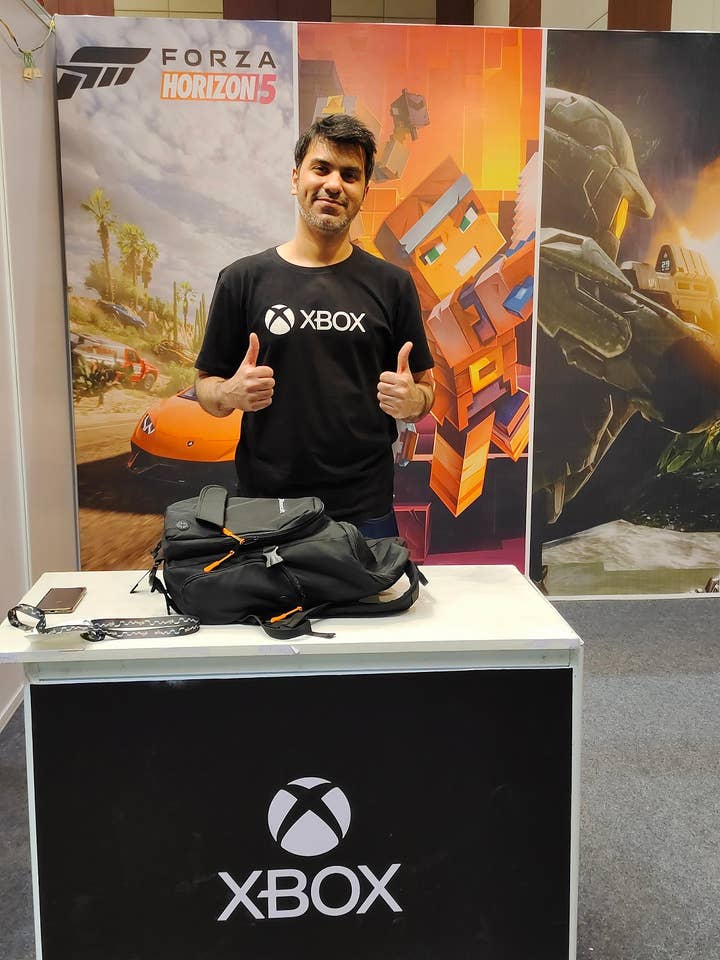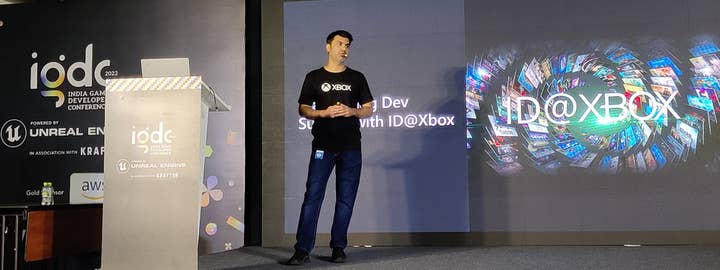Xbox: "We want to build on the potential we’re seeing in India"
Microsoft's gaming incubator manager Arjun Varma discusses the potential for India's indies and what Xbox is doing to support them
Sign up for the GI Daily here to get the biggest news straight to your inbox
While consoles like the PlayStation 5 and Xbox Series X|S haven't flown off store shelves in India, mobile gaming continues to scale one peak after another in the country.
Microsoft now has a team devoted to building its presence in India. At IGDC 2022 in Hyderabad, Telangana, we sat down with Arjun Varma, a manager at Xbox's new GXI (Global Expansion Incubator) team to talk all things ID@Xbox.
"The idea behind GXI is to engage and connect with the local developer community in India," he tells GamesIndustry.biz. "We want to support and enable this ecosystem to find success. We're looking at how we can get these titles published on Xbox in addition to other platforms. The gaming industry has boomed in the last few years and India is a really interesting market for us. There's a lot of cool content coming out and we want to build on the potential that we're seeing."
"The gaming industry has boomed in the last few years and India is a really interesting market for us"
He tells us that Microsoft intends to give indie devs "the same tools and resources that Microsoft's biggest partners have access to."
It's a bold promise given how few developers make use of some of those tools and resources. For example, Crackdown 3's cloud-powered destructible environments required computational power far beyond the Xbox One's capabilities, so developer Sumo Digital relied on Microsoft Azure's servers to do some heavy lifting. The result was a multiplayer mode where players could raze entire buildings with rocket launchers and other explosives. However, this demonstration was a short-lived, as no other studio has since taken advantage of similar tech in their titles.
When asked about forging similar partnerships with Indian studios, Varma is open to conversation.
"Our tools will place them [indie developers] on the same footing – Xbox Live experiences, devkits, all of that," he says.
"We're also looking at how we can leverage the ID@Azure program for Indian indie developers. Once you log in, you'll immediately get about $500 worth of free Azure credit. And when they start their journey, they will have an opportunity to earn up to $5,000 worth of free Azure credits. This will lower the barrier of creating games."
That number rises to a staggering $150,000 if you manage to qualify for both ID@Azure and the Founders Hub program.
The GXI team has been hard at work communicating with studios of all sizes. "All I've been doing is meeting developers to discuss their strengths and gaps" Varma tells us. "This gives us opportunities to support them as Xbox. From what I've seen, the kind of content in development across genres is really impressive. They've got a lot of potential in terms of narrative and art style. These games would do really well if given the chance."
Localization is also something Varma and his team are keen to address. In a country that's home to people who speak different languages and celebrate different cultures, appropriate messaging can be the difference between a warm reception and a smash hit.
"Cross-platform is the right way to go for a market in India"
"If they're coming from a different region, they will want to make sure that their messaging and marketing have localization integrated the right way. That's the kind of support we will provide for sure in terms of guidance and mentorship."
He admits that India is a "predominantly mobile market" and that "consoles are at a very early and nascent stage." Projected to reach 700 million gamers by 2025, India's mobile gaming market is brimming with potential. But the folks at Microsoft's GXI team are determined to expand on that, hoping to bridge the gap between smartphones and traditional games played on consoles and PCs.
Their silver bullet? Cross-platform tools.
While some studios don't have the resources to develop games for multiple platforms simultaneously, Varma stresses that a cross-platform approach has its perks.
"We're telling these devs to include mechanics that enable easy porting from or to consoles and PCs," he explains. "Cross-platform is the right way to go for a market in India. We encourage that and I've been seeing mobile devs include mechanics that simplify the porting process to consoles and PCs."
Varma's talk at IGDC revolved around how indie devs could seek the right support to get their games published on Xbox. He also laid out the expectations from ID@Xbox when it came to pitching games in the middle of development. Developers could get ahead by doing their research with respect to what genres did well on consoles, PCs and mobile devices respectively.
Due diligence could help developers omit common mistakes from both gameplay and marketing points of view. Videos that featured unique mechanics with dev commentary garnered more interest from the ID@Xbox than simple GIFs, images, or walls of text. Varma even had a chart with possible release dates for indie developers.

"Many free-to-play titles launch in January, which means the period between February and July is a better slot for indie titles. August tends to be busier in terms of indie game releases, especially with summer sales. September to November is AAA season followed by holiday sales that heavily favor AAA purchases."
His message was simple: it's worth putting more thought into your release window. After all, marketing your game and reaching the right audience is just as important as its polish and nuance.
And while releasing a game during a summer sale sounds good for a kickstart in sales, Varma asked devs to exercise caution. "Launch discounts might sound good in theory but they might be taken as a sign that the studio isn't confident enough to charge full price for a title. Use bonus launch content instead as a hook for potential customers."
He also touched on the marketing channels that games tend to see the most success with. While bagging partnerships with high-profile streamers does work, smaller studios gain more returns on investment with social media advertising. Varma advised against spending absurd amounts of money on hosting booths at game conferences or traditional forms of marketing like billboards or physical media.
"You're not going to get the results you want by spending more. Pick a form of advertising that works well with your game."
Varma is also vocal on Game Pass adoption across the country and what could mean for devs looking to work with Xbox. "Once they have a concept/demo and start interacting with us, there's a chance to publish it on Xbox Game Pass right from day one. Depending on how the game is received and how it is in terms of enjoyability and replayability, further consideration will be given in terms of Game Pass."
Varma's team is pretty optimistic about Xbox's future in India and the future of gaming as a whole. They believe gaming has opportunities for developers and artists of all skill levels. And with 5G around the corner, there's no telling where cloud gaming and AR/VR will take us.
"We're only going to get bigger from now, especially in a market like India"
"It's definitely one of the best fields to be a part of right now," he tells GamesIndustry.biz. "As someone who has been working at Microsoft and Meta as well, there are so many different areas to explore. It's a very lucrative career for sure. Getting into gaming at this point in time is the right thing to do."
He was quick to point out that it's not going to be easy. Varma noted that there was more to a game dev job than passion.
"In terms of the profession that I'm in, it's about going out there and following your passion and dreams. But along with those two things, it's important to know how to make money. And that applies especially to young people. It's good to experiment but after a point, you need to keep commercial viability in mind too."
"We're only going to get bigger from now, especially in a market like India. Try to find out your area of interest in gaming. Anything that you resonate with, dive in and ensure that you have a structure in place on how you want to start your journey right. Learn a little bit about how others have gone about achieving similar goals. Reach out to the right people for mentorship. My team would love to guide young people on how they can get started on their game dev story."
Sign up for the GI Daily here to get the biggest news straight to your inbox
